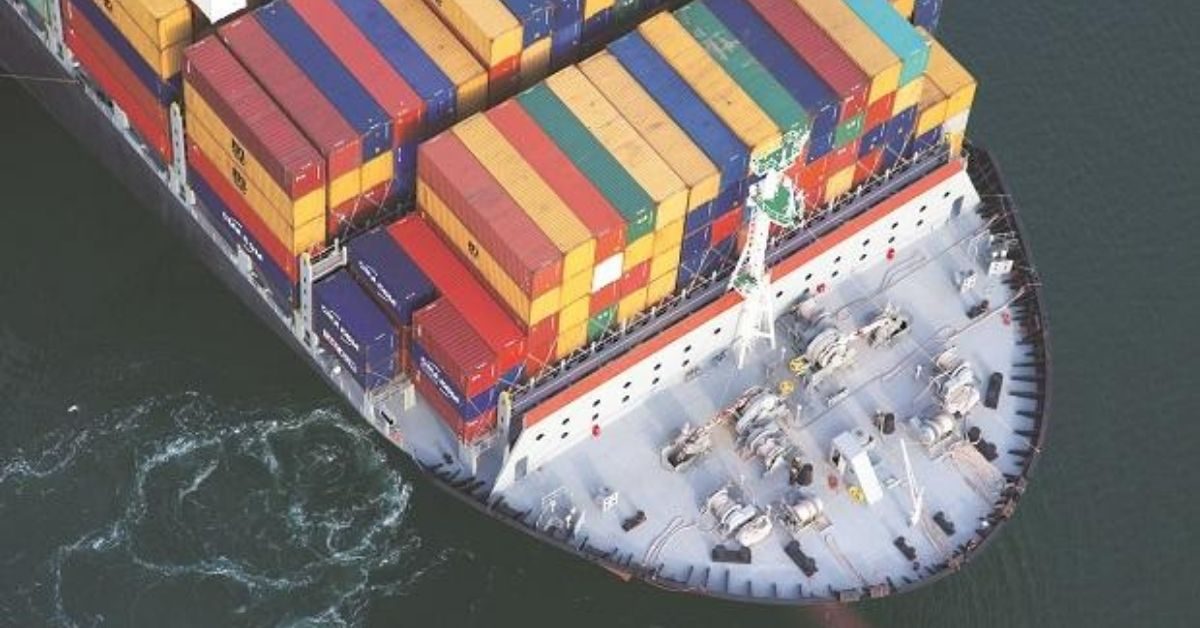A new 34-page report released today at the margins of COP28 details the annualised total costs of zero emission container vessels and the cost difference on a per container basis for transpacific and Chinese coastal ships under different fuel pathways.
The report from UMAS in the UK highlights how there is likely to be initially a significant cost gap between conventional fossil fuels and scalable zero emission fuels (SZEF) and there are differences across the scalable zero emission fuels considered. For example, in 2030 on the transpacific route, under the best-case fuel price scenario, UMAS analysts suggest the cost difference could be $150 per teu for green ammonia and $210 per teu for green methanol, and as high as $350 per teu for green ammonia and $450 per teu for green methanol in a high fuel price scenario.
However, with the right demand signals and willingness to pay the cost difference in the next few years which initiates the scaling up of production of the scalable zero emission fuels and policy support that follows in the diffusion phase, the authors of the study argue the cost gap is expected to narrow out to 2050.
Containerlines have been busy calculating what extra costs new fuels will bring to their clients. At TPM, container shipping’s top event, in Long Beach this February, Jeremy Nixon, the CEO of Japanese liner Ocean Network Express (ONE) told delegates the cost of fuel for containerships today is about $1,000 per feu.
“That’s roughly what the cost component is of using carbon fuel. These new fuels are going to be two or three times more expensive. So, potentially $2,000-3,000 will be the future fuel cost of moving a 40-foot container,” Nixon said.
“The role of early movers including cargo owners, and their willingness to pay is vital in setting up a zero-emissions shipping market,” a release issued from UMAS today states.
Camilo Perico, a consultant at UMAS and author of the report, said: “The fuel cost gap is now acknowledged as the main blocker for shipping’s transition and tackling it requires a frank conversation about the dimension of the challenge. We need numbers on the table and more visibility on how stakeholders can help to cover it. This report contributes to that dialogue by providing examples of baseline additional cost per container required to bridge the cost gap considering only technological savings. It shows the room that cargo owners, governments and other stakeholders have to contribute.”
The total cost of operation (TCO) approach, which considers both the capex investment in the vessels and operational expenditure including fuel prices, shows that by 2030, in the best-case scenario, to get a single vessel running on SZEF on the transpacific route would require an additional $20m to $30m per annum, of which $18m to $27m is fuel costs, and an additional $4.5m to $6.5m per annum, of which $3.6 to $5.2m is fuel costs, on the coastal route. This indicates the magnitude of freight purchase commitments required in the early stages of the emergence phase.
In 2030, the TCO for vessels on a transpacific route operating on green ammonia and methanol is two to four times that of a reference vessel operating on low sulphur heavy fuel oil (LSHFO). Over time, the cost differential is expected to narrow due to declining SZEF fuel costs. In 2050, most scenarios show a TCO that is 1.5 to 2 times that of conventional fuel.
“COP is a great opportunity to sense check how wider players in the energy system are perceiving shipping, especially since the revised strategy delivered at the Marine Environment Protection Committee (MEPC) this July, and if they have yet realised it is an obvious keystone/foundation for any national hydrogen strategies,” Dr Tristan Smith from UCL Energy Institute told Splash last week.
Aoife O’Leary, founder of the Skies and Seas Hydrogen-fuels Accelerator Coalition (SASHA) Coalition, agreed, maintaining it was critical to “priority set” and ensure shipping is at the “top table” when it comes to accessing the quantities of green hydrogen required to produce green methanol and ammonia.
“Indiscriminate use of green hydrogen could slow down the energy transition,” O’Leary warned urging shipping to coordinate with aviation counterparts to secure enough of the prized fuel.
Over the past decade, shipping emissions have risen 20%, according to UN data – a trajectory the world “simply cannot afford”, said Rebeca Grynspan, the secretary-general of the United Nations Conference on Trade and Development (UNCTAD).
“Our message at COP28 is very clear. Bold global action is necessary to decarbonise shipping,” Grynspan said, adding: “But shipping cannot decarbonise on its own. It requires action across the entire ecosystem.”
A new UNCTAD policy brief calls for bringing together carriers, ports, manufacturers, shippers, investors, energy producers and distributors to collectively help the industry decarbonise and ensure the process is just, fair and equitable.
The brief highlights that uncertainty over regulations and alternatives to fossil fuels are delaying the required investments.
The UNCTAD policy brief calls for the establishment of a universal regulatory framework applicable to all ships, regardless of their flag of registration, country of ownership or area of operation, to avoid a two-speed decarbonisation process and fragmented solutions and exemptions that distort the level playing field for shipping and trade.
UNCTAD is urging for the implementation of regulations that help minimise uncertainty, which currently hinders the investment decisions of shipowners, shipyards and ports. UNCTAD also joins a growing group urging for a carbon levy. Earlier at COP28, in arguably the single largest shipping headline-grabbing moment of the UN event so far, the CEOs of leading global shipping lines, MSC, Maersk, CMA CGM, Hapag-Lloyd and Wallenius Wilhelmsen, issued a joint declaration calling for an end date for fossil-only powered newbuilds and urging the International Maritime Organization (IMO) to create the regulatory conditions to accelerate the transition to green fuels.








